I just love all creatures great and small. From Gorillas to Bengal Tigers and from Lungfish to bizarre Stick Insects, they all play a tremendous role in the various cycles of our planet. These wonderful creatures are also some of our greatest signposts in our observance of inter-connection and inter-relatedness.
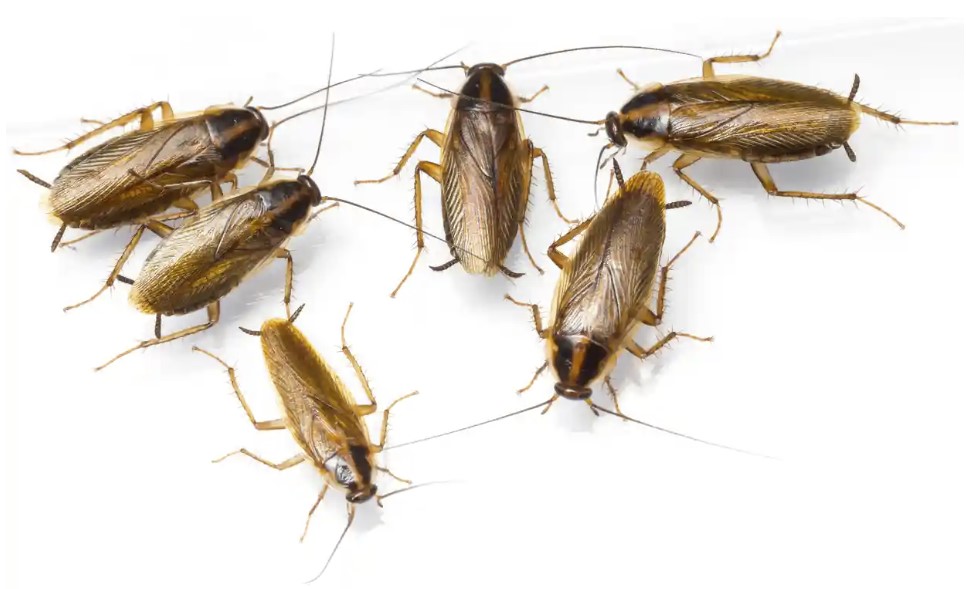
As a mother at the risk of her life watches over a child, so let everyone cultivate a boundlessly compassionate mind to all living beings.
With a background in natural sciences, I can still giggle at the antics of my fellow students who comically 'elevated' people such as David Attenborough and Dianne Fossey up to the level of 'prophet'. Yet these fore-runners and many eminent scientists, have opened a new world to our perceptions of animal characteristics, by exposing our many instinctual similarities.
I just love all creatures great and small. From Gorillas to Bengal Tigers and from Lungfish to bizarre Stick Insects, they all play a tremendous role in the various cycles of our planet. These wonderful creatures are also some of our greatest signposts in our observance of inter-connection and inter-relatedness.
In contrast, the human ego quite enjoys the process of categorizing animals into groups such as kingdoms, classes and species, and one break-away group that has reached its own elevated status in the scientific community, is called "The Pests". Apparently after transgressing the conventional term of "Pest Status," a pest can simply be "an organism that at a given place and time is undesirable." In jest, this brings up feelings of compassion for many politicians.
In this perceptive practice of naming and grouping things, we have also, by default, tapped into yet another aspect of our global crisis. This is the topic of pestilence. Animals such as cockroaches, locusts, rats, mice and ants have reached plague proportions due to our creation of natural imbalances. But while people experience the discomfort of sharing their world with these organisms, pestilence is really just another one of those things that arises in the mind. It is our memory perceptions that create whether something is 'good or bad' or perhaps 'pretty or ugly'. In truth, all phenomena that appears to be 'objective' or outside of us, is really a 'neutral event'. In other words, our mind plays tricks on us, to bring about a belief that one animal is perhaps more cute than another, or that an animal is 'scary' because it has those 'antenna things'.
The objects that we create within our 'subjective' mind can consist of all manner of things and could equally be a grocery bill, a load of laundry, a magnolia or a moon dance. Our mind believes these things to be separate entities, but any objects of our perceptions will begin to become who we are, and we can then live our lives in such a belief. Additionally, if we have attached a feeling to the object, such as fear or uncertainty, we will begin to become that feeling as well. There is a strong correlation here with that commonly used spiritual saying 'when we hate someone we actually hate ourselves'.
It is an uncanny act of the ego to discriminate quickly if it perceives something it doesn't like. It will 'cuss' and 'dis' the action of another unflinchingly without first searching for the exact same tendency within. Most of us are capable of harsh judgments based on 'teachings of old', and it is only with the benefit of hindsight that we break through the barriers, and begin to dwell in our own personal truth.
So where does our own personal truth arise in the animal kingdoms?
I wonder most cordially if some, or any, of us can skillfully look into our animal kingdoms with no discriminations, judgments or emotional reaction of any kind? For many of us this may seem a 'tall order', but to begin a line of inquiry perhaps we could look deeply into the existence of a small insect such as a gnat. When we bring the gnat's life into our field of awareness, it can be experienced that the gnat is also part of the earth. This is because at the end of its humble life the gnat will return to earth, and this is the same earth from which more gnats will arise. In other words if we can look beyond our perceptions we can experience the truth of one small part of the cosmos.
While this is just one small peek into a plethora of universal possibility, can we inquire if various awakenings can be gained from larger organisms such as our "household pests"? With a view to inter-communion and resolve, perhaps we can also locate some of the 'topsy-turvy perceptions' from our 'teachings of old' that we ultimately create in our daily mind.
The following are some of the most common creatures that we encounter around our homes and work places, with some comment of their inherent and observable value.
Ants -The humble workers
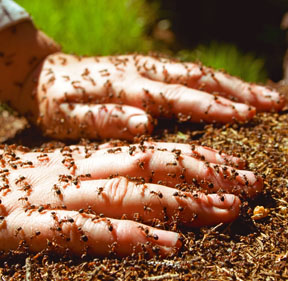 If we begin with the humble 'ants', perhaps some of us may become immediately irritated by their presence and continuous onslaught. We may even feel to some degree that our private space has been invaded. However to go beyond this initial irritation we can expose the significant ant characteristics of patience, order and discipline, which are great reminders of our Buddhist practice.
If we begin with the humble 'ants', perhaps some of us may become immediately irritated by their presence and continuous onslaught. We may even feel to some degree that our private space has been invaded. However to go beyond this initial irritation we can expose the significant ant characteristics of patience, order and discipline, which are great reminders of our Buddhist practice.
To look a little further we may also feel 'community-minded' and see the reality of future needs. Maybe we see ourselves as a planner and prefer to build our dreams slowly, or perhaps we are content in knowing that everything will come to us in 'its own good time'.
The ant teaches us how to become the architect of our lives, and shows us that great success comes with persistence. They demonstrate how to work and co-operate with others in companionship and unison and that harmoniously, we all share the same sun, the same earth and the same breath.
From the alternate perspective, duality can arise when things divert away from harmonious balance and our obsessions may cause some lop-sidedness. At this point of our observance, perhaps we could ask ourselves... are we making things a little harder than they need to be? Have we ourselves been intruders by not being patient with the efforts of others? Are our huge future 'ant mounds' just ego constructed palaces or are we truly operating from the perspective of our inner pathway and journey? Here we could also ask.... are these fortresses just 'castles in the air', or worse, are we trying to move in too early?
Ants also produce chemical messengers for the good of the whole community. Can we inquire if we are producing chemicals for our common good or are we unknowingly contaminating our personal places with pheromones of fear, depression, anger...? May we also question whether we are mindfully 'in line' with our body's bio-chemical processes or are we just continually polluting ourselves with the toxic nature of mindlessness?
Using discipline, we can certainly lay a foundation for success through a combination of individual effort and co-operation, and our friend the ant is the great promise of success through these efforts. Though we need to be ever mindful that we will all live and die, the ants will live and die, and that in a hundred years no one will be giving our historical brief existence a second thought.
Bees-The production of Sweet Honey
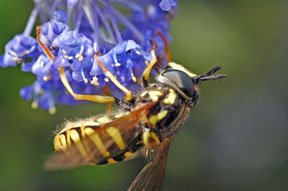 As the bee collects nectar and fragrance, so let the sage dwell on earth.......The Buddha
As the bee collects nectar and fragrance, so let the sage dwell on earth.......The Buddha
The Bee reminds us to extract the honey of life, and to make our lives productive while the sun shines. No matter how great the dream is, they remind us that there is a promise of fulfillment if we pursue our dreams.
Just like the Buddha finally accomplished enlightenment through persistence, the Bee is the forerunner of accomplishing what may seem to be the impossible. Aerodynamically, their bodies are too large for their wings and shouldn't be able to fly. While we now have some understanding of how their flight occurs through a high rate of wing movement, their amazing symbol of accomplishment still remains positioned within our hearts.
If a Bee has shown up in our life, perhaps we could examine our own productivity. Are we doing all we can to make our life more fertile? Are we busy enough? Are we making time to savor the honey of life? As bees are primarily female, can we observe our co-operation with our own female population.....all three billion of them?
Bees are also some of the most wonderful dancers. The Bee dance is about sharing the information with their nest mates about where to find suitable pollen reserves. In this way they share their survival and future enhancement of the hive as they buzz together in harmony. In other words they are tremendous Bodhisattvas in their practice of helping others to find their nectar. From this perspective, perhaps we could inquire if we ourselves are helping people to find their 'true nature' by making the Chan Way available, or do we just practice so singly that we restrict the practice to a monoculture: ourselves?
It is an interesting phenomenon for the human ego, that when a bee stings it actually dies. Perhaps we could ask that if we are planning on going out to sting someone, which part of us will die in the process? There is an old saying, "if we start a war against someone else, its best we take two coffins."
In Japan, large and combative Hornets attack all manner of honey bee hives to obtain protein for their nests. Buddhist monks living in country Japan, perform the art of Bee farming using native Japanese Honey Bees, and they know well, that their bees may be targeted by the Hornets. As Buddhists who have decided to do no harm, they allow this natural event to occur each year. This is to ensure that all phenomenal and karmic processes will follow their natural progression.
As the Hornets quickly mass produce and begin their onslaught, it is often the local European Honey Bee hives from the surrounding civilian farms that are attacked first. This is because these commercial bees have little to no defense against the might and sheer size of the Hornets. The whole attack usually ends with catastrophic results, as the flimsy attempts by the Europeans expose their natural imbalance to their surroundings.
Japanese Honey Bees however, have evolved next to these mighty hornets and have developed their own mechanism for defense. While they are still quite vulnerable to attack, they have learned that if they wait patiently until the large hornets enter their hive, they can smother the intruders with their numerous workers and body heat. This is because they have a body heat tolerance of 2 degrees higher than the hornets. In other words, the numerous bee workers will bake the attacking hornets which results in both their demise and an evolutionary leap into the 'unknown'.
As the Eightfold Path is our defense against all intrusions into our peaceful harmlessness, the bee shows us that endurance and inter-related action is a key in the persistence of our evolving and enduring qualities. The Buddha said that "endurance is one of the most difficult disciplines, but it is to the one who endures that the final victory comes".
Cockroaches-The Sensitive Story of Survival
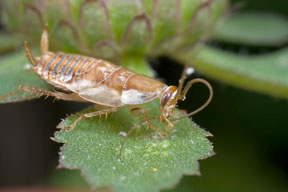 Although often seen as a disgusting creature due to our societie's tormenting perceptions, the cockroach is actually a gifted teacher in the art of survival and successful adaptability. With over 300 million years of experience, it is also especially clever in an environment that may seem more than a little hostile.
Although often seen as a disgusting creature due to our societie's tormenting perceptions, the cockroach is actually a gifted teacher in the art of survival and successful adaptability. With over 300 million years of experience, it is also especially clever in an environment that may seem more than a little hostile.
Their best defense is privacy and various species of Cockroaches spend up to 80% of their life in their quiet harborages, only emerging out for food and survival. This is perhaps a good indicator for us to also take out some time for silence, and may also conjure up archetypal images of our mountain ascetic ancestors who have done the same.
At a recent Buddhist function, I listened to the words of a retreat master who would spend up to 7 years in solo hermitages, with much of this time in silent practice. After subsequent clinical brain testing, it was noted that his practice for lengthy periods had not only altered his neural patterning, but increased numerous biochemical processes to produce positive results. In other words he was simply happier due to the practice. Another increased by-product of many years of meditation was an increased sensitivity to his immediate surroundings. He was able to be attuned to things that the average person would pay no attention to.
Similarly Cockroaches have highly evolved and developed sensitised structures called 'Cerci', which assist them to detect sensitivities in their environment. So when the Cockroach appears in our private space, may we also inquire if our sensitivity to subtle changes can become magnified? If this is apparent, will we have the instinct of the Cockroach to scurry out of danger, when faced with harmful situations that enhance our suffering?
While the sensitive Cockroach more than teaches us how to use what we have available to us for survival, they also teach us how to view the temporary nature of life and death. As they remove and consume their dead, they teach us to not only clean out the dead and redundant aspects of our lives, but to mindfully contemplate death is part of our Zen practice. This, in turn, can bring greater clarity and resolve on our path towards Nirvana.
The Spider - The Feminine Entanglement
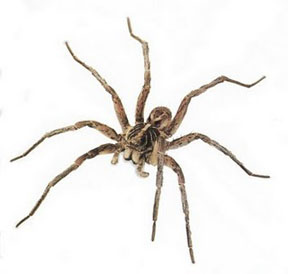 The Spider is a direct experience of the female nature of things. It is the female spider who spins the extraordinary webs and tends the eggs all the way to the emerging spiderlings and beyond. Can we inquire if we protect our own Dharma with the same enthusiasm? As both the larger of the two genders and a great protector, she has been raised to the level of 'The Divine Feminine' in many spiritual circles. This is not to say that the male does not play an integral role in the spider world, its just that it will probably cost him and arm or a leg to participate. He may also loose his life in courtship.
The Spider is a direct experience of the female nature of things. It is the female spider who spins the extraordinary webs and tends the eggs all the way to the emerging spiderlings and beyond. Can we inquire if we protect our own Dharma with the same enthusiasm? As both the larger of the two genders and a great protector, she has been raised to the level of 'The Divine Feminine' in many spiritual circles. This is not to say that the male does not play an integral role in the spider world, its just that it will probably cost him and arm or a leg to participate. He may also loose his life in courtship.
The spider therefore shows us the reasoning for balanced and equal relationships between the genders. Joe Jackson's immortal lyrics.... "if there's war between the sexes then there will be no people left" could be an added catch cry here in spider inferences.
Spiders are also the keepers of the primordial alphabet in that their body is shaped like the number eight and they have eight legs. Their eight legs have been known to represent the four winds of change and the four directions. To us this can be a great reminder of The Eightfold Path and The Four Noble Truths spoken by The Buddha.
As the spider weaves the web with such poise, grace and protection, it reminds us to weave magic into our own life. This is certainly a better option than the production of mindless tangled webs and unnecessary entanglements!
The Rat - The Resourceful Tireless Survivor
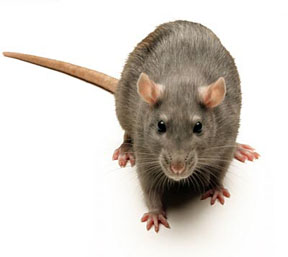 The Rat is the first sign of the Chinese Zodiac, symbolizing fertility and wealth and they are also a Japanese symbol for Daikoku, in the realm of the god of prosperity. Rat qualities such as these are elevated in our world because of their simple reminders for our own exalted yet common behaviour.
The Rat is the first sign of the Chinese Zodiac, symbolizing fertility and wealth and they are also a Japanese symbol for Daikoku, in the realm of the god of prosperity. Rat qualities such as these are elevated in our world because of their simple reminders for our own exalted yet common behaviour.
The Rat also represents prudence and foresight, which is the reason you see rats leaving a ship before it sinks, or scurrying out of a building before it collapses. They show us to be shrewd with our practice and avoid possible vexations ahead of time. They literally show us how to gain foresight in any coming situation and to avoid subsequent problems.
While rats are cunning and shrewd, and provide good defense against unsuitable circumstances, they can also be restless and nervous, which can sometimes be to their detriment. This is called neophobia, which describes a fear of new things or objects in their environment. Could this really be a form of contempt prior to investigation? If so, can this also be found in our own human disposition? Or perhaps it could suggest that we should approach new situations with attuned awareness, prepared to extricate ourselves if our warning lights go off indicating danger?
One day, the Buddha sat down in the shade of a tree and noticed how beautiful the countryside was. Flowers were blooming and trees were producing wonderful new greenery. However, among all this beauty, he saw much unhappiness. A farmer beat his ox in the field. A bird pecked at an earthworm, and then an eagle swooped down on the bird. Deeply troubled, he asked, "Why does the farmer beat his ox? Why must one creature eat another to live?"
During his enlightenment, the Buddha found the answer to all of these questions and he discovered three great truths, which he delivered in a simple way for everyone to understand.
He explained that nothing is lost in the universe. Matter turns into energy, energy turns into matter. A dried leaf turns into soil, where a seed sprouts and becomes a new plant. In other words we are the same as the ants, the cockroaches, the trees and the clouds. We consist of that which is around us and we are the same as everything. If we destroy something around us, we destroy ourselves. If we cheat another, we cheat ourselves. Understanding this truth, the Buddha and his disciples did what they could wherever possible, to resist the harming any living being.
He also offered that "Everything Changes". Life is like a river flowing and ever-changing. Once dinosaurs, mammoths, and saber-toothed tigers roamed this earth, and when they all died out, it was not the end of life. Other life forms like smaller mammals appeared, including, mice, squirrels, feral cats and us.
And thirdly he spoke of karma. Every action has a consequence in accordance with the underlying motivation of the action. When action arises out of purity, selflessness, kindness and caring, its effect is to uplift, to heighten the spiritual state of the universe. When action arises out of fear, hate, or anger, its effect is to lessen ourselves and our fellow human beings; to lessen the spiritual state of the universe. What we say, and what we do matters enormously and collectively can make a tremendous impact on the wellbeing of humanity. Only through mindfulness can we be properly attuned to the motives of our actions.
When we practice this mindful awareness it produces compassionate empathy for all forms of life, particularly for all sentient creatures. The Dhammapada's ethical injunction to not do evil, but to do good in the alleviation of suffering, is also known as the Bodhisattva Ideal, and is embodied in the prayer of universal loving-kindness: "May all beings be free from enmity; may all beings be free from injury; may all beings be free from suffering; may all beings be happy."
Will we also feel the same way the next time we see a cockroach or an ant? Maybe the answer lies in the observation of our resourceful rats and mice. Perhaps the eightfold legs of the spider will remind us of our chosen path.
One could argue that the world we live in today, and the 'pests' we encounter, are significantly different from the world in which The Historical Buddha lived. This is true! It is also true that we have The Buddha within all of us. So where do the 'Pests' reside?
